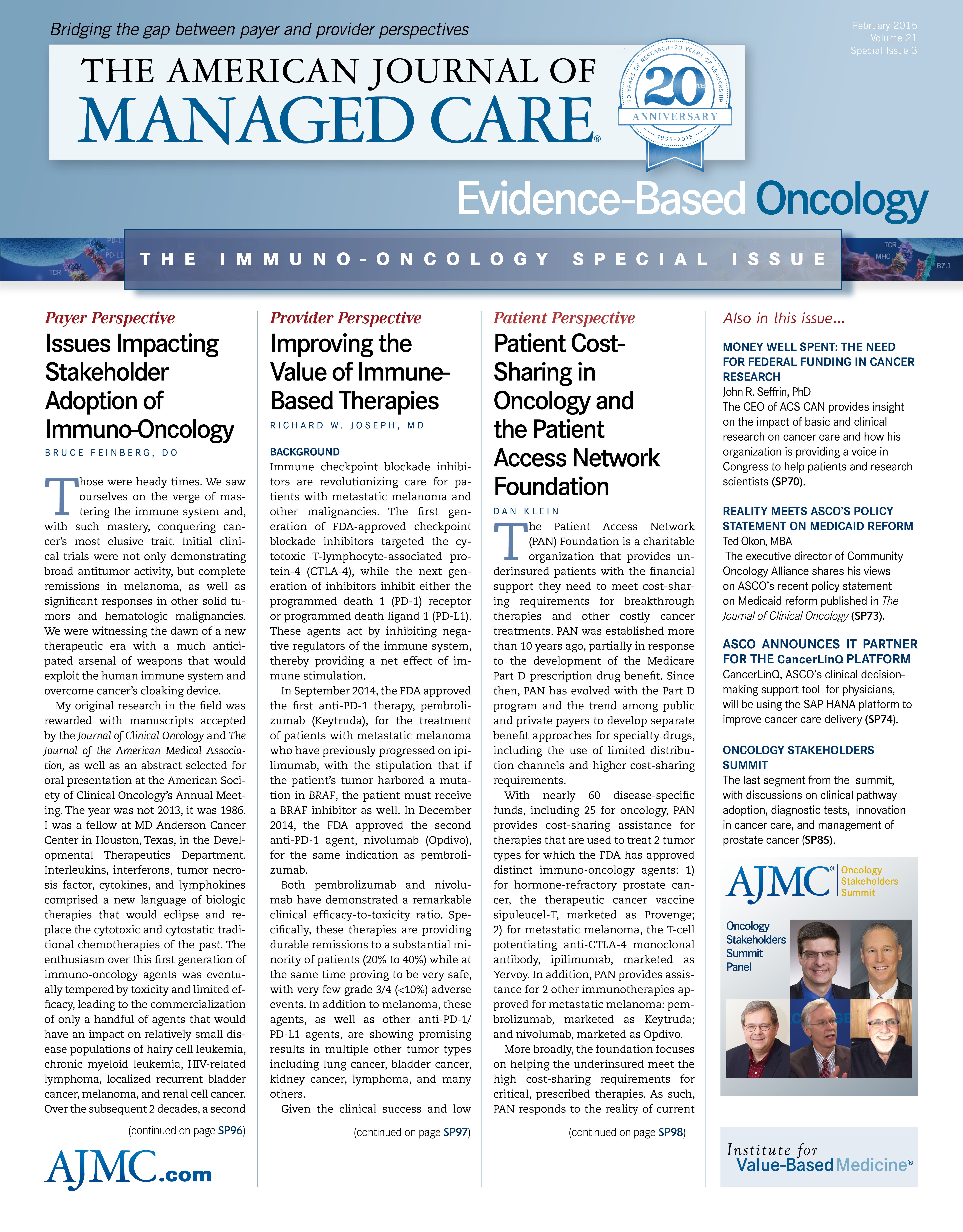- Center on Health Equity & Access
- Clinical
- Health Care Cost
- Health Care Delivery
- Insurance
- Policy
- Technology
- Value-Based Care
ASCO Demands Medicaid Reform
The American Society of Clinical Oncology (ASCO) has broadened its reach in recent months with policy statements on healthcare affordability and the value of cancer care. As discussed previously in Evidence-Based Oncology,1 ASCO is constructing a value framework to obtain optimal cancer care outcomes at the lowest possible cost. However, cost is just one aspect of the equation, as was pointed out by Richard L. Schilsky, MD, chief medical officer at ASCO, in the article. The relative value of treatment is defined by both the clinical benefit that it affords and its toxicity, he writes.
While the beginning of 2014 saw the Value in Cancer Care brief issued by ASCO’s Value in Cancer Care Task Force,2 the end of the year witnessed a paper published by the society in the Journal of Clinical Oncology that called for major reform in Medicaid policies in the United States. These recommendations were expected to improve cancer care for the nearly 2.1 million cancer patients or survivors among the approximately 68 million Medicaid enrollees in the United States (see Figure).3 At last count, 28 states had adopted Medicaid expansion and 7 states were in discussions to consider signing up.4
With high-quality cancer care for all as their premise, the ASCO policy recommendations were centered on the following key principles:
• Every individual diagnosed with cancer should have health insurance that ensures access to high-quality cancer care by a cancer specialist.
• Medicaid beneficiaries with cancer should receive timely and quality care comparable with those who have private insurance.
• Medicaid payments should be sufficient to ensure that beneficiaries have timely access to quality cancer care. Cancer patients on Medicaid should not face barriers to clinical trial participation.5
Several studies have examined the influence of adequate Medicaid benefits and health outcomes of beneficiaries with cancer. Medicaid expansion, for example, improved all-cause survival within 5 years at the county level by more than 6% in the expansion states, with a significant reduction in delays in care.6 Another study found that persons diagnosed with cancer who had Medicaid coverage at the time of their diagnosis fared far better than those who were uninsured when diagnosed. The reasoning behind this observation? Individuals without health coverage, who later went on to enroll in Medicaid (likely following their diagnosis), presented a more advanced stage of cancer than those who were already covered.7
A recent study in the American Journal of Preventive Medicine examined the influence of Medicaid expansion on the disparities in preventive care for low-income women. The study assessed pre-Affordable Care Act breast and cervical cancer screening between expansion and nonexpansion states. The results showed that women in states that did not expand Medicaid were less likely to receive recommended mammograms or Pap tests. The authors predicted a high risk of widening healthcare disparities resulting from nonexpansion.8 The key recommendations of the executive committee on Medicaid reform have been summarized in the Table.
EBO
To allow for optimal patient care, the goal of these ASCO recommendations is to realize an adequate balance between federal and state budgets and fair payments and reimbursements for health service providers. For low-income individuals, Medicaid could be a lifeline. However, to bring healthcare providers on board, many of whom are currently wary of the existing policies, the system is in need of reform, the JCO article previously mentioned concluded.
References
1. Schilsky RL. ASCO’s initiative to define value in cancer care. Am J Manag Care. 2014;20(11):SP341.
2. ASCO in action brief: value in cancer care [press release]. Alexandria, VA: American Society of Clinical Oncology; January 21, 2014. http://www.asco.org/advocacy/asco-action-brief value-cancer-care.
3. Quality cancer care still a goal, not a reality, for most low-income Americans: ASCO calls for major Medicaid reform [press release]. Alexandria, VA: American Society of Clinical Oncology; November 17, 2014. http://www.asco.org/press-center/quality-cancer-care-still-goal-not-reality-most-lowincome-americans.
4. Current status of state Medicaid expansion decisions. Kaiser Family Foundation website. http://kff.org/health-reform/slide/current-status-of-themedicaid-expansion-decision/. Updated December 17, 2014. Accessed January 7, 2015.
5. Polite BN, Griggs JJ, Moy B, et al. American Society of Clinical Oncology policy statement on Medicaid reform. J Clin Oncol. 2014;32(36):4162-4167.
6. Sommers BD, Baicker K, Epstein AM. Mortality and access to care among adults after state Medicaid expansions. N Engl J Med. 2012;367(11):1025-1034.
7. Bradley CJ, Gardiner J, Given CW, Roberts C. Cancer, Medicaid enrollment, and survival disparities. Cancer. 2005;103(8):1712-1718.
8. Sabik LM, Tarazi WW, Bradley CJ. State Medicaid expansion decisions and disparities in women’s cancer screening. Am J Prev Med. 2015;48(1):98-103.

Ambient AI Tool Adoption in US Hospitals and Associated Factors
January 27th 2026Nearly two-thirds of hospitals using Epic have adopted ambient artificial intelligence (AI), with higher uptake among larger, not-for-profit hospitals and those with higher workload and stronger financial performance.
Read More
Exploring Racial, Ethnic Disparities in Cancer Care Prior Authorization Decisions
October 24th 2024On this episode of Managed Care Cast, we're talking with the author of a study published in the October 2024 issue of The American Journal of Managed Care® that explored prior authorization decisions in cancer care by race and ethnicity for commercially insured patients.
Listen
Motivating and Enabling Factors Supporting Targeted Improvements to Hospital-SNF Transitions
January 26th 2026Skilled nursing facilities (SNFs) with a high volume of referred patients with Alzheimer disease and related dementias may work harder to manage care transitions with less availability of resources that enable high-quality handoffs.
Read More

